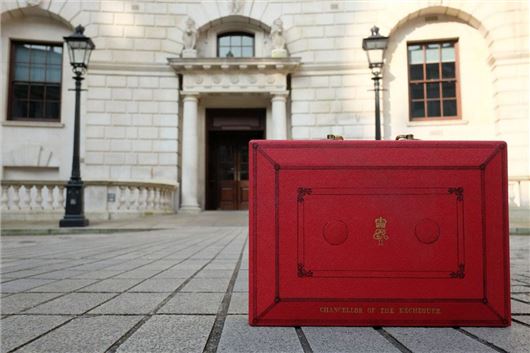Budget 2021: What it means for drivers

The Government has unveiled its spending plans for the next 12 months in the Budget 2021. Chancellor of the Exchequer, Rishi Sunak, has made important announcements for road tax VED and fuel duty.
Fuel Duty
Fuel duty remains frozen for the 11th consecutive year. The Chancellor claims the move saved the average motorist up to £1600 since 2010, with the planned 2p-per-litre tax hike being frozen for another year.
Vehicle Excise Duty (Road Tax)
VED rates again rise in line with the RPI inflation rate on 1 April 2021. As a result, road tax VED for a car registered on or after 1 April 2017 will increase to £155 per year. Cars with a list price of over £40,000 when new pay an additional rate of £335 per year on top of the standard rate, for the first five years the standard rate is paid (typically from the second to sixth year). There are also some significant rises in the first year rate (commonly known as the showroom tax).
Owners of older cars, registered between 2001 and 2017, will typically pay an additional £5 per year.
VED for electric cars remains zero
All electric car owners qualify for free road tax VED. Previously, EVs which cost more than £40,000 when new, incurred a VED rate of £320 per year for five years in what became known as 'premium tax'. However, this rule was abolished on 1 April 2020, which means the £40,000 premium tax no longer applies to electric cars.

 Dan Powell
Dan Powell
 Top 10: Diesel cars to buy in 2016
Top 10: Diesel cars to buy in 2016
 Surprisingly small new engine for Range Rover Sport
Surprisingly small new engine for Range Rover Sport
 New Skoda Kodiaq offers seven-seat moments
New Skoda Kodiaq offers seven-seat moments
.jpg) First UK Drive: Honda FCX Clarity
First UK Drive: Honda FCX Clarity
 Jaguar revises XE, XF and F-Pace, with new engines and tech
Jaguar revises XE, XF and F-Pace, with new engines and tech
 Honest John Awards 2017: Land Rover Discovery Sport named Most Popular SUV for second year in a row
Honest John Awards 2017: Land Rover Discovery Sport named Most Popular SUV for second year in a row
 2022 Smart #1 SUV: price, specs and release date
2022 Smart #1 SUV: price, specs and release date



![2020 Vauxhall Crossland X 1.2T [130] Elite Nav 5dr [Start Stop] Auto](http://images.honestjohn.co.uk/imagecache/url/crop/90x60/https/cdn.uk.prod.group-mobility-trader.com/images/cas/5638ee70004eb6a1b12ccd7384ba004b/71e1219699eb85a9eedbd4eeb22c9c1b.jpg)

.jpg)






kelvin66 on 3 March 2021
Re: "However, from 1 April 2021, the £40,000 premium tax no longer applies to electric cars."According to: www.gov.uk/vehicle-tax-rate-tables
Cars registered on or after 1 April 2017
Vehicles with a list price of more than £40,000
You have to pay an extra £325 a year if you have a car or motorhome with a ‘list price’ (the published price before any discounts) of more than £40,000. You do not have to pay this if you have a zero emission vehicle.
Therefore BEV cars over £40K do not pay £325 a year...
Eric Haigh on 3 March 2021
Fuel Duty.Where on earth does he get a saving of £1,600 a year for the average motorist - and we trust him to balance the books?
If I do 5,000 miles p.a. at, say, 20 mpg then I use 250 gallons or 1,136.5 litres of fuel. Multiply that by 2p per litre and my annual saving is £22.73. If my car did 40 mpg my saving would be £11.37p. Whoopee. One for Pinocchio there then.
To save £1,600 pa I'd have to do 140 x 5,000 pa = 700,000 miles a year. Just suppose my average speed was 70 mph then for that I'd be driving 10,000 hours pa or 27.39 hrs per day every day of the year. What a joke.
I presume the Gov checked the figures (NOT) before releasing that statement but even if they meant a cumulative saving over 10 years of £1,600 then I'd have to do 70,000 miles pa to save £160; and if my average speed was only 35 mph (I wish - check your OBC) then that's still 8 hours a day Monday through Friday. No time for work then, so I'd be on benefits and pay no NI or income tax into the kitty.
To complete the sheer stupidity of the Chancellor's claim - 70,000 pa @ 40mpg takes 1,750 gallons or 8,000 litres. At an average £1.25 per litre that adds up to £10,000 pa in fuel cost alone of which 57.95p per litre or £5,795 pa is duty. Then there's road and insurance tax bph (before pot holes).
Remember, this is 2p he's not adding on rather than 2p he's taking off. And he thinks he's doing the motorist a favour???
gordon115 on 3 March 2021
You've read it wrong.
What he means is since 2009 when the last increase was, an average driver has save £1600 over 11 years.
NOT £1600 this year.
Eric Haigh on 4 March 2021
Gordon. I've NOT read it wrong. "Fuel duty remains frozen for the 11th consecutive year. The Chancellor claims the move will save the average motorist up to £1600 a year, with the planned 2p-per-litre tax hike being frozen for another year."
Now if the Chancellor meant something different then he should have said what he meant. Mind you, that's like asking a politician to do what he says he'll do.
In case HL or the source had misquoted him I also looked at a saving of £1,600 over 10 years but you seem to have skipped the second half of my comment where I show that you have to do 70,000 miles pa to save £160 a year at 2p per litre and at a cost of £10,000 pa. That figure assumes 40mpg which few people average especially in congested city and urban driving.
The truth is he's claiming implausible figures and dressing them up as a good deal for the motorist. Ha. When did we ever get one of those? It is what it is and there's nothing we can do about it but it's so arrogant and insulting of him to think that we wouldn't spot the spin. It's the same every budget no matter who's the Chancellor.
You seem to be supporting him though. Do you do 70,000 miles pa? Get 40 mpg overall? Or are you like the rest of the UK averaging 7,500 per car per year? The average annual 'saving' for the average British motorist is therefore 7,500 / 40 x 4.546 x £0.02 = £17.05 - an almost tenfold overstatement from his claimed £160. That stinks.
Trilly. Well spotted.
VED is totally unfair and beyond logic but the need for votes is judged greater than the need for reform. The £40,000 threshold remains unchanged in consideration of their and their peers' desire for a decent low tax car when not in the Gov limo or for a flashy EV they can feel smug in and stay on message for public consumption. I'm curious to know how they'll replace VED and fuel duty when they've forced all ICE cars off the road. Let's see how the voters like that one.
N.B. Note to HJ editor. Did you ever publish the results of your survey on how we thought VED should be calculated? Was a cost per mile driven the winner?
Eric Haigh on 4 March 2021
Sorry. "In case HL or the source ..." should have read HJ.
emjayel on 5 March 2021
Re: Fuel Duty
Firstly I am not an admirer of the Boris clan (and I presume you are not as well) but this strikes me as being a lengthy moan for the sake of it. It is not a lot I agree but perhaps you would just prefer the 2p to be added or the subject just not mentioned i.
Emjayel
cliff pollard on 3 March 2021
someone has done their sums.Eric Haigh on 3 March 2021
VED. I have a 2001 3.3 ltr classic car which fell into a lower tax rate for registrations pre 23/03/06. That rate seems to have disappeared and all classes are now based on emissions.As my manufacturer never published any emissions figures and there are none on the V5C, what am I supposed to do?
Trilly on 3 March 2021
Lets hope that hasn't changed as in exactly same position with a 3.3ltr 2003, My car manufacturer also no published emissions, @Eric have a feeling manufacturer beginning in with A but not French :-)
Also have a 330, 2002 so would be in double trouble.
Eric Haigh on 4 March 2021
Trilly. Log on to the A... Register (as a guest if not a member - it's free anyway, full of good stuff, so you might as well join) and go to General Forum where you'll find the answer under VED changes. Also applies to your 330. ATB and looking forward to open air motoring soon.
Contax139 on 3 March 2021
2p a litre on 700 miles a year at 40mpg would not cost me that much, increasing tax from £30 to £35 affects me. Bought car new Feb 2011 and just coming up 7K miles, can't afford to sell.999pez on 3 March 2021
I see the premium tax threshold is still stuck at £40,000 and has never increased since it's introduction. It seems that inflation doesn't apply here.Also interesting that the Government use the defunct RPI rather than CPI for increases in VED.
Jack Currie on 3 March 2021
It's all abit unfair by my reckoning. I pay something like £350 VED for a Jaguar S-Type that does less than 3k a year while a small car paying just £30 [or perhaps nothing] but doing 30k miles a year must surely cause much more environmental damage than I do.HASHMUKHLAL AMLIWALA on 4 March 2021
VED is too high which ever way you look at it. If all the money collected from ved and fuel go to the road management We would have smooth roads everywhere. However lot of the funds are channeled off to other things as benefits and like and the motorists keep on paying and putting up with worst roads than some of the so called third world countries. There is no way all the cars will be Electric by the time allocated as they are prohibitively expensive to start with.gary bampkin on 4 March 2021
Note to all..The Chancellor says up to £1600 a year..So if you have made a saving of a penny piece, he is technically right !!!on 4 March 2021
Why don't electric cars pay road tax? They wear out the infrastructure just as much as a fossil fuelled car which incidentally also pay (fuel) tax in proportion to distance driven. Recent research has also shown a significant amount of pollution created at the road/tyre interface which applies to all vehicles.Add a comment